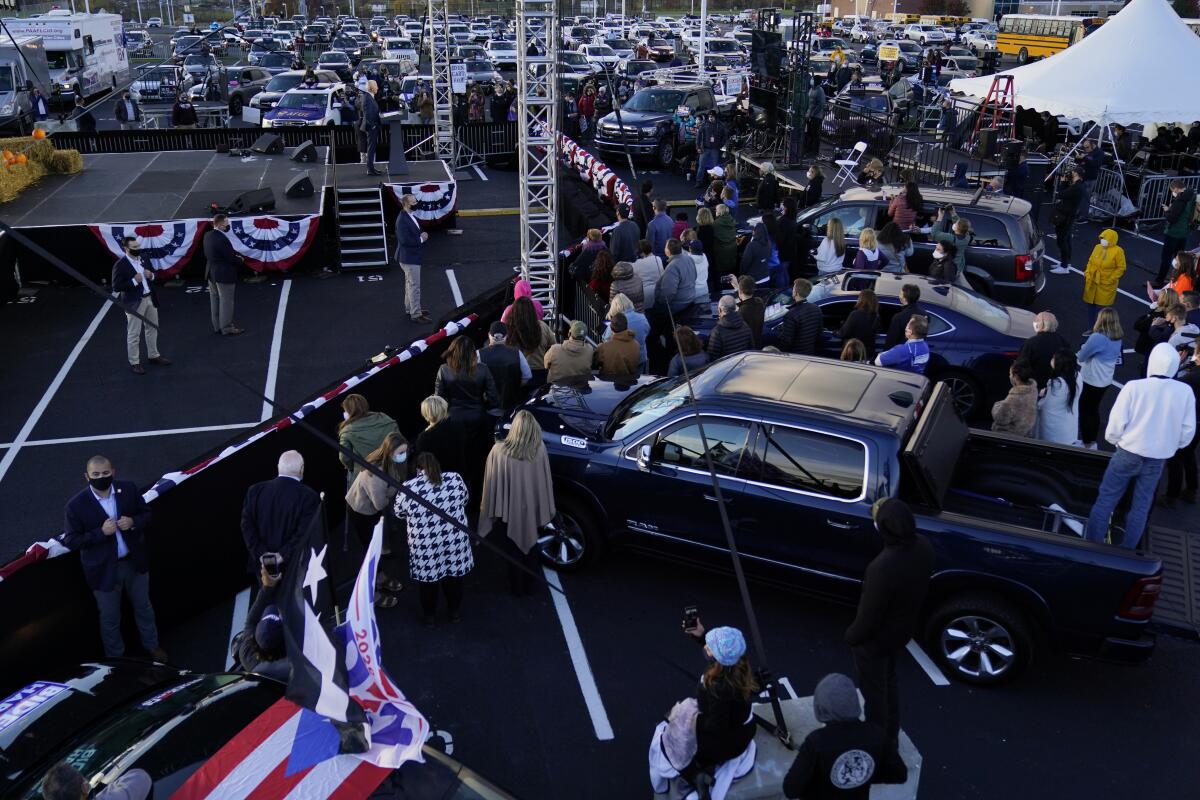Letter from Pittsburgh: At the center of the 2020 storm, Pennsylvanians say, ‘Enough already’

PITTSBURGH — We’re not answering the phone anymore. We’re muting the political ads during Steelers football games. We look away when we approach the highway billboards telling us to vote. We are tearing off the sticky handbills plastered daily on our front door. And we are throwing away almost all our mail.
The other day, as with pretty much every day this month, my mailbox was stuffed with political fliers, some excoriating former Vice President Joe Biden as corrupt, others charging that President Trump murderously mishandled the coronavirus threat. Who says snail mail is dead?
Not Rich Fitzgerald. “My mailbox is full,” said the county executive here in Allegheny County, the second-most populous in Pennsylvania. “The economy might be tough right now, but somebody’s making a lot of money in the COVID period by selling direct mail.”
The two candidates are fighting fiercely for the 20 Pennsylvania electoral votes that Trump won four years ago, carrying the state by the smallest presidential election margin (less than three-quarters of a percentage point) in 176 years.
This time Biden, who has visited the state more than a dozen times, has a 7-point lead, according to the latest Muhlenberg College poll. He spent all of Saturday here, with a rally in Bucks County, which barely leaned to Hillary Clinton four years ago, and then went to Luzerne County, which Trump won in 2016, for a “drive-in” rally that the president mocked hours later.
Trump has visited western Pennsylvania twice in a 10-day period — and Wednesday told a crowd along the Lake Erie coast, a traditional Democratic area that the president captured by a small margin four years ago, that he would return to Pennsylvania several times before election day.
This was not originally in his playbook. “Four or five months ago, when we started this whole thing — because, you know, before the plague came in — I had it made. I wasn’t coming to Erie,” Trump said. “I mean, I have to be honest, there’s no way I was coming.”
As the presidential election nears, Democrats and Republicans are targeting Florida’s other Latino voters, not just Cuban Americans and Puerto Ricans.
Now there’s no way he wasn’t coming. The stakes are huge, and they are clear: If Trump wins this state, he has a 73% chance of winning a second term; but if Biden wins, his chance of taking the White House soars to 97%, according to the data analysts at FiveThirtyEight.com.
“Pennsylvania is quickly becoming ground zero for both campaigns,” said John Brabender, a GOP political strategist who was born and attended college in Erie and is working with the Trump campaign. “A lot of highways in the state are going to be shut down for different motorcades in the last few days before the election.”
All this is new and somewhat unsettling for Pennsylvanians.
The Democrats won the state for six consecutive presidential elections between 1996 and 2012, and when Clinton dropped in to campaign in 2016, she did so almost exclusively in safely Democratic areas, especially on college campuses. The state’s primaries usually are in late spring, when presidential nominations often are settled and when campaigning often is pro forma if it is conducted at all.
Voters in Iowa and New Hampshire, early-winter sites of the first two tests in the presidential political season, are accustomed to being besieged by ads, surrounded by lawn signs and assaulted by robocalls. Not here.
“Now all of you in Pennsylvania know what we experience during the Iowa caucuses,” said Barbara Trish, a political scientist at Iowa’s Grinnell College. “Even those of us who love politics, or teach politics, get sick of the incessant phone calls and the ads, back to back on local news during caucus season. Now it’s your turn. Good luck.”
Trump — facing financial challenges in a contest in which the Democrats have more campaign money than the Republicans — is doubling down in Pennsylvania even as he has pulled back on advertising in Michigan and Wisconsin, two other swing states in the industrial heartland.
Here in Allegheny County, in southwestern Pennsylvania, Democrats are hoping to exceed Clinton’s margin in 2016 (108,137 votes) and are working to cut the Trump margins in nearby Westmoreland (56,833), Butler (35,844) and Beaver (15,636) counties.
Three decades ago, when he worked in the state in a landmark 1991 Senate race between former GOP Gov. Dick Thornburgh and civil rights activist and Kennedy administration aide Harris Wofford, the Democratic political strategist James Carville described Pennsylvania as “Philadelphia and Pittsburgh, with Alabama in between.”
Everyone acknowledges that Philadelphia (where the Clinton margin was more than 5 to 1 in 2016) and Pittsburgh are comfortably in Biden’s pocket. At the same time, “Alabama” — that vast swath of Pennsylvania that forms a fat “T” in the middle of the state, where Trump signs abound and where, apart from Biden’s Scranton birthplace, there is hardly any evidence that the Democratic nominee is even alive — is decisively for Trump.
In those areas, there are signs of new GOP voter registrations.
Since June, Republicans have added 10,000 new voters to the rolls in Lancaster County in south-central Pennsylvania, 2½ times as many new voters as the Democrats have added. Overall, Republicans have registered 77,634 more voters statewide than Democrats since early June — the result, GOP strategists contend, not of a massive registration drive but of what they call an “organic” movement, principally by members of union families and people in the middle of the state, toward Trump.
These are people who attracted less by the Republican Party than by what Brabender calls “an agenda and an attitude.”
And yet that same agenda and attitude is shaping the race in three heavily populated and vital suburban counties abutting Philadelphia. Democrats last year won county-council majorities in the traditionally GOP counties of Bucks and Chester, and won all five seas in Delaware County, which has been a Republican stronghold for more than 150 years. The competition there, as in many states this autumn, is for the female vote, with Biden holding a decisive advantage.
Overall, according to the Washington Post/ABC News Poll, suburban women in Pennsylvania prefer Biden to Trump by a 59-41 margin.
Trump’s “Twitter personality is off-putting to women,” said Dana Brown, the executive director of the Pennsylvania Center for Women and Politics at Pittsburgh’s Chatham University. “Even his female supporters don’t approve of what he does online. He won by such a narrow margin here in Pennsylvania last time that the female vote is critical to him. He’s got such a short time to fix that — and I can’t imagine there are many women on the fence.”
If they, or male voters, still are on the fence, there’s a huge effort underway to persuade them.
The other day my mailbox included four pamphlets urging us to vote, a letter from Barack Obama explaining that “voting is easier than ever in Pennsylvania,” a large coated card-stock mailing proclaiming that “JOE BIDEN’S TAX PLAN WILL DESTROY OUR ECONOMIC FUTURE” and an even bigger one debunking the president’s view that voting isn’t secure and adding, “But you haven’t believed Donald Trump‘s lies before, so why start now?”
That’s what the campaigns are saying. What Pennsylvanians are saying is: “Enough already!”
More to Read
Get the L.A. Times Politics newsletter
Deeply reported insights into legislation, politics and policy from Sacramento, Washington and beyond. In your inbox three times per week.
You may occasionally receive promotional content from the Los Angeles Times.











